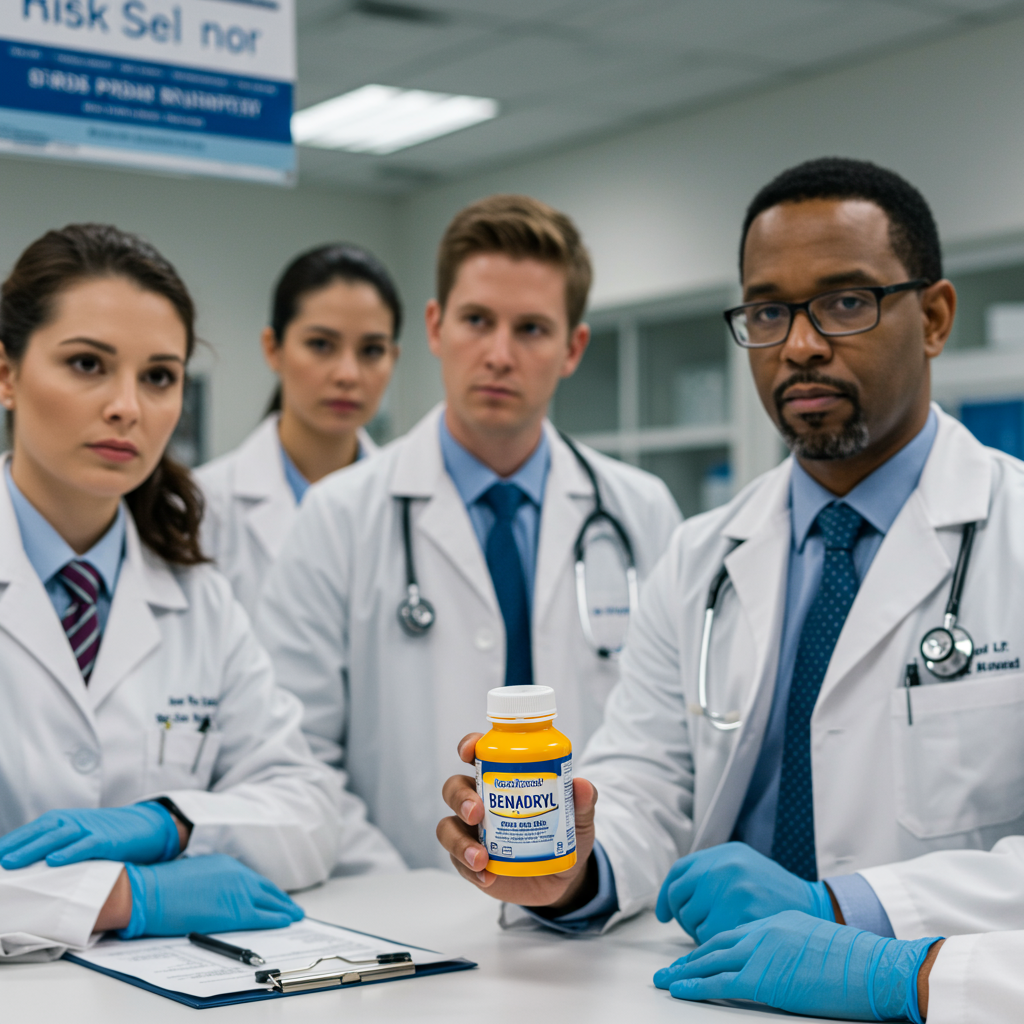For decades, diphenhydramine, often recognized by its popular brand name Benadryl, has been a household staple for allergy relief, sleep aid, and cold symptoms. Yet, a growing chorus of medical experts is now sounding the alarm, suggesting that the risks associated with this common over-the-counter medication may significantly outweigh its perceived benefits. They advocate for a decisive shift towards safer, more effective alternatives, urging consumers to re-evaluate its place in their medicine cabinets.
Why Medical Experts Are Challenging Diphenhydramine’s Role
The re-evaluation of diphenhydramine stems from its limitations and potential dangers, particularly when misused or considered against modern alternatives. Dr. Anna Wolfson, an allergist at Massachusetts General Hospital, observes dangerous misuse daily. She highlights a critical point: for serious allergic reactions like food allergies, the immediate and proper treatment is epinephrine, not diphenhydramine. Relying on diphenhydramine in such emergencies is perilous because its sedating effects can mask worsening symptoms, potentially delaying life-saving interventions.
A February review by allergy experts from Johns Hopkins University and the University of California, San Diego, echoed these concerns. They strongly recommend removing diphenhydramine from U.S. over-the-counter and prescription markets. Their conclusion is stark: this medication is “outdated, dangerous, and eclipsed by safer alternatives.”
Understanding the First-Generation Antihistamine
Approved in 1946, diphenhydramine is classified as a first-generation antihistamine. It works by blocking histamine H1 receptors, which are involved in allergic responses, thus alleviating symptoms like sneezing and itching. However, unlike newer drugs, diphenhydramine is less selective. It crosses the blood-brain barrier easily, affecting other parts of the brain. This lack of selectivity leads to its well-known side effects, including significant sedation and cognitive impairment. In some instances, it has even been linked to dangerous cardiac effects.
Despite its long history, experts argue its continued widespread use, especially for conditions where superior treatments exist, is problematic. The American Pharmacists Association notes its usage spikes in summer for bug bites and seasonal allergies, yet many healthcare providers are now questioning this tradition.
Disproportionate Risks: Vulnerable Populations
While many perceive diphenhydramine as harmless due to its OTC status, its risks are particularly pronounced for specific demographics.
Concerns for Older Adults
For older adults, the drug can linger in the body for up to 18 hours. This prolonged presence can lead to persistent sleepiness, disorientation, and a heightened risk of falls. The Johns Hopkins/UC San Diego review also highlighted a potential link between long-term diphenhydramine use and an increased risk of dementia, a deeply concerning finding that underscores the need for careful consideration in this population.
Risks in Children
The dangers are even more acute in children. Review authors cited cases of accidental overdose, paradoxical reactions (like agitation or extreme sedation, even coma), and tragically, fatalities, especially with pediatric formulations. The “Benadryl Challenge” on TikTok, which led to multiple child hospitalizations and deaths, tragically demonstrated the drug’s potent and unpredictable effects in young individuals.
Dr. Manuela Murray, director of general pediatrics and urgent care at the University of Texas Medical Branch, stresses that diphenhydramine “should not be used lightly.” She advises that its use should always be under the guidance of a medical professional, reserving it primarily for specific allergic reactions and motion sickness.
The Problem with Misuse: Beyond Allergy Treatment
Many families unintentionally misuse diphenhydramine, often believing it can help with cold symptoms or act as a safe sleep aid. Dr. Alyssa Kuban, a pediatrician at Texas Children’s Pediatrics, frequently sees this pattern. “I see some families use diphenhydramine when the child has a cold or upper respiratory infection, thinking it will help with the congestion and help them to sleep better at night,” she explains. However, it’s ineffective for cold symptoms and not a safe sleep aid, particularly for children, where it can paradoxically cause hyperactivity.
The Consumer Healthcare Products Association (CHPA), representing OTC medicine manufacturers like Benadryl’s maker Kenvue, states that common side effects are disclosed on product labels. They emphasize that “these products are not intended for long-term use” and advocate for responsible use, urging consumers to follow directions and consult healthcare providers with questions.
Safer, More Effective Alternatives Are Available
Fortunately, healthcare professionals now have a range of superior alternatives to recommend, offering better efficacy with fewer side effects.
Second-Generation Antihistamines
Dr. James Clark, lead author of the Johns Hopkins paper, advises patients to try alternatives such as loratadine (Claritin), cetirizine (Zyrtec), or fexofenadine (Allegra) for allergy symptoms. These second-generation antihistamines offer several advantages: they are longer-lasting, less sedating, and do not cause the same cognitive impairment as diphenhydramine. Dr. Kuban recommends over-the-counter cetirizine for children with hives, seasonal allergies, or itchy rashes due to its longer duration and less sedating profile. For infants, saline drops and suctioning are safer, more effective options for congestion.
Breakthroughs in Severe Allergy Management
For severe allergic reactions like anaphylaxis, which can be life-threatening, epinephrine remains the gold standard. However, the delivery method for this critical medication has recently seen a significant innovation. San Diego-based ARS Pharmaceuticals has secured FDA approval for Neffy, an epinephrine nasal spray. This needle-free alternative to traditional auto-injectors (like EpiPen) is now approved for children as young as 4 years old, weighing 33 to 66 pounds (1mg dose), and for broader use in adults (2mg dose).
Richard Lowenthal, CEO of ARS Pharmaceuticals, emphasizes that a needle-free option will expand access and reduce administration hesitation, eliminating needle-related injuries. Many individuals delay or avoid administering life-saving epinephrine due to injection phobia, a barrier Neffy’s “needle-free, easy-to-use design” aims to overcome. Dr. David Fleischer, a professor of pediatrics at Children’s Hospital Colorado, hails Neffy as a “breakthrough treatment,” predicting it will “significantly improve health outcomes and enhance quality of life” by empowering people to act swiftly during an allergic emergency. The 1mg dose of Neffy is expected to be widely available by late May, offering a vital, less intimidating option for managing severe allergies.
The Path Forward: Responsible Use and Informed Choices
Diphenhydramine is present in over 300 over-the-counter formulations, frequently blended into combination products for coughs, colds, and flu. The authors of the review suggest that, at a minimum, diphenhydramine products should be moved behind the counter. This would allow pharmacists to guide patients toward safer, more appropriate second-generation alternatives.
The American Pharmacists Association advises caution with combination cold products containing diphenhydramine. They also encourage patients and caregivers to consult their pharmacist for the most suitable treatment recommendations with the fewest side effects, particularly for older adults with a history of cognitive impact from medications.
Clinical data suggests diphenhydramine does not outperform second-generation drugs in randomized trials and has minimal effect on nasal congestion. Newer options, like oral cetirizine, offer 24-hour coverage with fewer adverse events. Despite this, millions of prescriptions are still written annually in the U.S., not accounting for untracked OTC purchases.
Experts believe it’s “time to say a final goodbye to diphenhydramine, a public health hazard.” While acknowledging its past utility, its therapeutic ratio is now matched or exceeded by second-generation antihistamines, which offer markedly reduced adverse reactions. Making informed choices, guided by healthcare professionals, is crucial for consumer safety and effective symptom management.
Frequently Asked Questions
What are the primary concerns experts have about diphenhydramine?
Medical experts, including those from Johns Hopkins University and the University of California, San Diego, express significant concerns about diphenhydramine’s safety and effectiveness. They highlight its potential for causing sedation, cognitive impairment, and dangerous cardiac effects. For older adults, it increases the risk of falls and has a possible link to dementia. In children, it has been associated with accidental overdoses, paradoxical reactions like agitation, extreme sedation, and even fatalities, as tragically seen in events like the “Benadryl Challenge.” Furthermore, it is often misused for conditions like colds or as a sleep aid, for which it is ineffective and potentially harmful.
What are safer and more effective alternatives to diphenhydramine for allergy symptoms?
For general allergy symptoms like sneezing, itching, and runny nose, experts recommend second-generation antihistamines such as loratadine (Claritin), cetirizine (Zyrtec), and fexofenadine (Allegra). These medications are longer-lasting, cause significantly less sedation, and have fewer side effects than diphenhydramine. For infants experiencing congestion, safer alternatives include saline drops and nasal suctioning. Always consult a healthcare professional to determine the most appropriate treatment for specific symptoms and age groups.
Is diphenhydramine safe or effective for severe allergic reactions like anaphylaxis?
No, diphenhydramine is neither safe nor effective as a primary treatment for severe allergic reactions (anaphylaxis). Experts like Dr. Anna Wolfson emphasize that epinephrine is the first-line, life-saving treatment for anaphylaxis. Diphenhydramine’s sedating effects can dangerously mask worsening symptoms of a severe reaction, delaying critical care. Newer, needle-free alternatives for epinephrine delivery, such as Neffy nasal spray (approved by the FDA for both adults and children as young as 4), represent a significant advancement, offering an easier and less intimidating way to administer life-saving epinephrine promptly during an allergic emergency.
In conclusion, while diphenhydramine has a long history, its continued widespread use is now being seriously questioned by medical professionals. The availability of safer, more effective alternatives for both everyday allergies and life-threatening reactions like anaphylaxis means that consumers have better choices than ever before. Always consult with a doctor or pharmacist to ensure you are using the most appropriate and safest medication for your needs.


